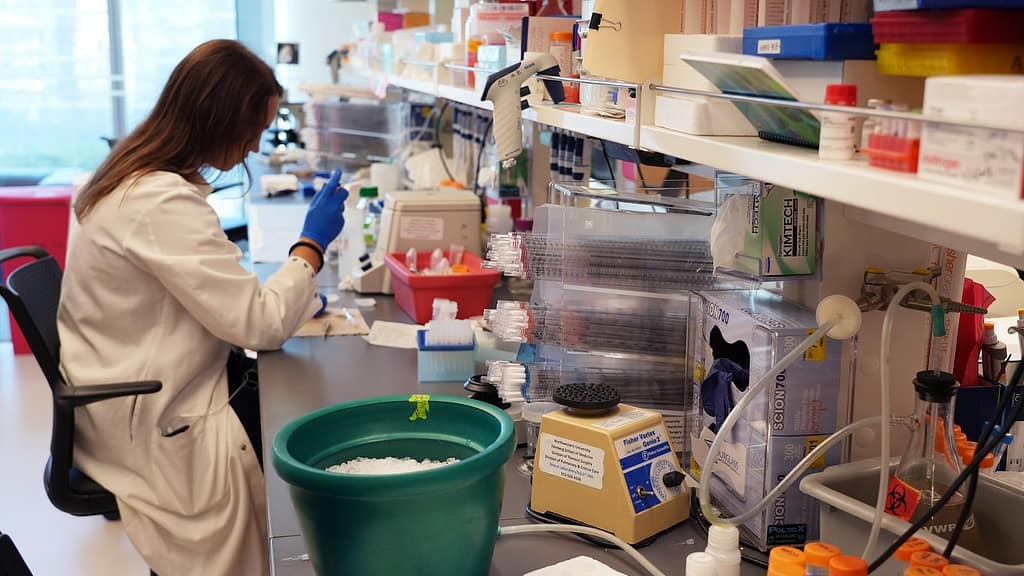Immune cells produced during severe COVID-19 infection may shrink tumors. The unexpected mechanism offers a new therapeutic possibility for advanced and treatment-resistant cancers.

According to a study in mice, immune cells generated during a severe COVID-19 infection may reduce the size of malignant tumors.
According to the study, which was published Friday, November 15, in The Journal of Clinical Investigation, the immune system produced unique cells with anti-cancer characteristics as a result of genetic information from the COVID-19 virus. These immune cells, which are monocytes, a subset of white blood cells, assisted in the reduction of several cancer kinds in mice.
Normally, when monocytes gather at a tumor location, cancer spreads. According to the research main author Dr. Ankit Bharat, chief of thoracic surgery at Northwestern Medicine, the tumor cells subsequently transform these monocytes into cells that are conducive to malignancy. Tumor growth is subsequently made possible by these monocytes’ assistance in protecting the cancer cells from the immune system.
Bharat told Live Science that they basically construct a castle-like structure around the cancer cells to keep the body’s immune system from invading them.
Changes in monocyte characteristics can be induced by inflammatory circumstances such as COVID-19, according to a previous study. Dr. Christopher Ohl, a professor at Wake Forest University School of Medicine in Winston-Salem, North Carolina, and an infectious-disease specialist at Atrium Health Wake Forest Baptist, who was not involved in the study, explained that these “induced” monocytes are trained to specifically target the virus in order to coordinate a more potent immune response.
Following infection, Bharat and his colleagues observed that the tumors of several individuals with significant COVID-19 and malignancy shrank.
They thus examined blood samples from patients who had experienced a severe episode of COVID-19 and discovered that monocytes generated during a severe infection have a unique receptor that bonded effectively to a particular COVID-19 RNA sequence.
“COVID RNA is the ideal match if the monocyte were a lock and the COVID RNA was a key,” Bharat stated.
Mice with various Stage 4 cancer tumors, including melanoma, lung, breast, and colon cancer, were also examined by the researchers. A medication was administered to the mice in order to stimulate monocytes and replicate the immunological response to COVID-19 infection. For the four cancer types under investigation, the tumors shrank.
The researchers observed that the altered monocytes exhibited anti-cancer capabilities. Additionally, tumors do not transform these generated monocytes into “cancer-friendly” cells that protect tumors.
The altered monocytes, in contrast to most immune cells, moved to the tumor locations in the animals. When the monocytes got close to the tumor, they triggered natural killer cells. Then, according to Bharat, the cancer cells were targeted by the killer cells, which caused the malignancy to shrink.
Bharat believes that because the process interferes with the way that most tumors travel throughout the body, it may also be effective against different forms of cancer in people. “By activating this pathway, we precondition the monocytes to never become the cancer-friendly cells,” added Bharat.
According to Bharat, the COVID-19 vaccines currently on the market are unlikely to activate this mechanism since they do not employ the same RNA sequence as the virus. However, he continued, future medications and vaccinations could be created to promote the growth of monocytes that fight cancer.
Crucially, the process offers a fresh treatment option for advanced tumors that don’t react to immunotherapy or other methods that use the body’s immune system to combat the disease.
Although immunotherapy is effective in about 20% to 40% of cases, treatment may not be successful if the body is unable to generate enough functional T cells, which kill cancer cells, according to Dr. Yibin Kang, a Princeton University molecular biology professor who was not involved in the study. Less than 15% of cancer patients saw an “effective anti-cancer immune response” using immunotherapy medications alone, according to a 2021 research published in the British Journal of Cancer.
Kang told Live Science, “The reliance on T cell immunity against cancer is the problem [with current immunotherapy].”
According to Kang, the latest work is encouraging since it suggests a method of killing tumors specifically that does not require T cells.
Ohl concurred, describing the technique as a “detour” that avoids the conventional obstacles that immunotherapy encounters.
To find out if the method has the same anti-cancer impact in people, clinical trials are still required.